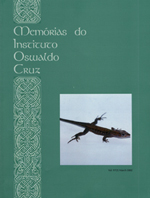
|
Memórias do Instituto Oswaldo Cruz
Fundação Oswaldo Cruz, Fiocruz
ISSN: 1678-8060
EISSN: 1678-8060
Vol. 110, No. 4, 2015, pp. 453-460
|
 Bioline Code: oc15057
Bioline Code: oc15057
Full paper language: English
Document type: Research Article
Document available free of charge
|
|
|
Memórias do Instituto Oswaldo Cruz, Vol. 110, No. 4, 2015, pp. 453-460
| en |
Interleukin-10 rs2227307 and CXCR2 rs1126579 polymorphisms modulate the predisposition to septic shock
Cardoso, Cristina Padre; de Oliveira, Argenil José de Assis; Botoni, Fernando Antônio; Rezende, Isabela Cristina Porto; Alves-Filho, Jose Carlos; Cunha, Fernando de Queiroz; Estanislau, Juliana de Assis Silva Gomes; Magno, Luiz Alexandre Viana & Rios-Santos, Fabricio
Abstract
Despite major improvements in its treatment and diagnosis, sepsis is still a leading cause of death and admittance
to the intensive care unit (ICU). Failure to identify patients at high risk of developing septic shock contributes to an
increase in the sepsis burden and rapid molecular tests are currently the most promising avenue to aid in patient risk
determination and therapeutic anticipation. The primary goal of this study was to evaluate the genetic susceptibility
that affects sepsis outcome in 72 sepsis patients admitted to the ICU. Seven polymorphisms were genotyped in key
inflammatory response genes in sepsis, including tumour necrosis factor-α, interlelukin (IL)-1β, IL-10, IL-8, Tolllike
receptor 4, CXCR1 and CXCR2. The primary finding showed that patients who were homozygous for the major
A allele in IL-10 rs1800896 had almost five times higher chance to develop septic shock compared to heterozygotes.
Similarly, selected clinical features and CXCR2 rs1126579 single nucleotide polymorphisms modulated septic shock
susceptibility without affecting survival. These data support the hypothesis that molecular testing has clinical usefulness
to improve sepsis prognostic models. Therefore, enrichment of the ICU portfolio by including these biomarkers
will aid in the early identification of sepsis patients who may develop septic shock.
Keywords
sepsis; septic shock; biomarkers; polymorphisms; inflammation; intensive care unit
|
| |
© Copyright 2015 - Memórias do Instituto Oswaldo Cruz
Alternative site location: http://memorias.ioc.fiocruz.br
|
|
